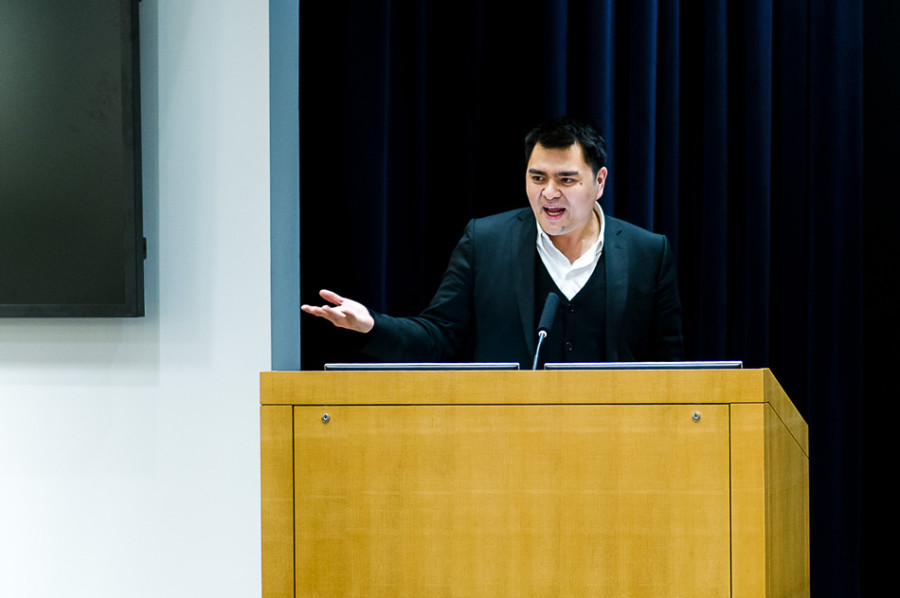Jose Antonio Vargas discusses undocumented immigration
Sophie Mann/The Daily Northwestern
Jose Antonio Vargas, activist and Pulitzer-prize winning journalist, discusses “Define America,” his non-profit organization that aims to open a discussion about the state of undocumented people in the United States. Vargas came to Northwestern as this year’s College Democrats’ winter speaker.
March 5, 2015
Activist Jose Antonio Vargas spoke Wednesday night about the role the media and the government have in defining the lives of undocumented people who consider themselves American, but don’t have the right papers.
Vargas visited NU as College Democrats’ winter speaker. About 80 people attended the event, which was held at the McCormick Foundation Center Forum.
Vargas revealed his status as an undocumented immigrant in a 2011 essay for The New York Times Magazine and has since spoken widely about the rights of undocumented immigrants in the United States. Today, the Pulitzer Prize-winning journalist leads Define American, which aims to create dialogue about the criteria used to define who is American.
To Vargas, presenting facts as they are is a way to improve the conversation about undocumented immigrants. He said that news sources sometimes don’t include certain facts in their stories because they don’t fit their narrative.
“Who we are is framed by who we talk to, who we watch, what we see, what we listen to and what culture, what the media, what television, what radio, what film, what they tell us who we are,” he said. “The real question is, who are we? And when we talk about immigration, given the fact that immigration is always in the news, do we really know what we’re talking about? Are we really on the same page? My argument is that we are not.”
Vargas said he was surprised when the federal government’s Immigrations and Customs Enforcement didn’t deport him after coming out as undocumented in his NYT Magazine essay, and he decided to find out why.
“I called the editor of Time magazine, and I said ‘Hi, you know, I think I want to write a follow-up story about why I haven’t been deported,’ ” he said. “In that year alone, President Obama’s administration deported 400,000 people, and I wasn’t one of them. So I actually called ICE myself and I said ‘Hi. I haven’t heard from you. What are you going to do with me?’ ”
The government told him they had no comment on his case.
“You know, that’s like a metaphor, actually, for what all of you think of us in general: No comment. I mean, so long as somebody is babysitting your kid, and mowing your lawn and serving you drinks, you’re good, you’re comfortable,” Vargas said. “Its just a bunch of illegal people anyway. Why does it matter to you?”
The follow-up story published in Time is the proudest moment in his journalism career, he said, because he managed to get 36 undocumented people on the cover of Time magazine.
“For me, writing this cover story, and what I’ve been doing in the past four years, reporting on immigration, using myself as a vehicle to tell a much more personal and much more pointed story on what being undocumented means in this country … As far as I’m concerned, I’m practicing journalism,” he said.
He then referred to details that often go unnoticed in worldwide media, like the fact that undocumented laborers have paid over $100 billion in taxes in the last decade and that since 9/11 the U.S. government has invested more than $100 billion dollars in border and immigration control. Vargas said that when people start learning these things, they start seeing undocumented immigrants in a new light.
“Can you imagine if we actually told them that we pay billions in taxes and social security, that we are actually responsible for keeping social security solvent? How many people would actually change their minds if they knew that?” he said. “Again, it doesn’t fit the narrative, so they don’t know that.”
That is why Vargas founded Define America, he said, to bring facts like these to light and to focus the discussion about undocumented immigration on the humanity of the issue: the families broken apart by deportations, the laborers mistreated by their employers.
Quentin Heilbroner, president of College Democrats, said people like Vargas and their stories make people realize that the issue is much more complicated than how the media frames it.
“He has an incredible life, an incredible career and incredible stories,” the Weinberg junior said. “And more important, an incredible and important message.”
Shilpa Reddy, who attended the event for a class, said Vargas’ speech made her aware of how big the pro-immigration movement is and the important role undocumented people have in the U.S.
“I honestly had no idea how much these undocumented people contribute to society, and he was able to lay down the statistics and the facts and illustrate that they actually do,” the Weinberg freshman said.
Email: marianaalfaro2018@u.northwestern.edu
Twitter: @marianaa_alfaro



